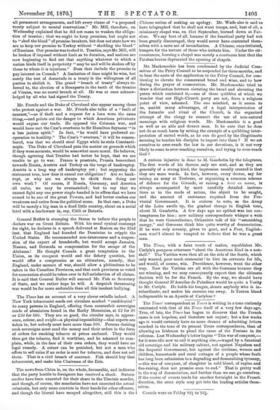Mr. Fronde and the Duke of Cleveland also appear among
those who protest against a war. Mr. Froude also talks of a "fault of ananner,"—as if theft and a request for a loan were the same thing,—and points out the danger to which American privateers would expose our trade. He opposed the Crimean war, and would have met the Czar's overtures to Sir Hamilton Seymour "in
less jealous spirit." In fact, "he would have preferred co- -operation to hostility." The Czar's "overture," it will be remem- bered, was that we should steal Egypt while he stole Constanti- nople. The Duke of Cleveland puts the matter on grounds which if they were accurate, would be somewhat more moral. He believes, though agreeing that Treaties had better be kept, that we are amable to go to war. France is prostrate, Prussia benevolent towards Russia, Austria and Turkey on the verge of bankruptcy. Austria is a long way off bankruptcy yet ; but supposing the statement true, how does it cancel our obligation ? Are we bank- rupt, or why are we always to skulk from doing our -own work ? Of course, if Russia, Germany, and America :all unite, we may be overmatched ; but to say that we cannot fight any one power single-handed is to affirm that we have -ceased to be one of the great Powers, and had better confess our weakness and retire from the political scene. In that case, a Duke will be merely a big man in a dead little country, about on a social level with a landowner in, say, Chili or Batavia.


































 Previous page
Previous page